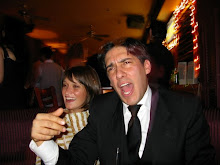
First Grade Education 2
Originally uploaded by lorenzodom
Last Sunday, my six-year old and I sat down to play an innocent game of Scrabble.
Thinking I had the upper hand as an adult with years of experience and a more extensive vocabulary, I gave him home court advantage and told him to go first.
Smiling, he throws me a curve ball and puts down S - E - X.
Shocked, I laugh and ask, "Where did you learn that word?"
Smiling bigger then ever he blurts out, "Skateboard Camp!"
I roll my eyes in response, not sure what I should think and then place my word extending left from the e: D - A - T - E.
Enzo once again proceeded to surprise me with his next word, S - I - N.
The congruency of the words and their meanings was all-too uncanny and laden with significance, especially considering that a six-year old still had another good ten years or so before he would truly understand the weight of these words and their overlapping inferences.
More importantly though, I thought about how at this sprite age he was safe from having to deal with the guilt associated with the social phenomena that was being played out upon the board.
Or was he? At what age should this sort of education begin? Intuitively and based on my own personal coming-of-age experience I feel that it is not until mid-adolescence that I will need to teach my boys about the birds and the bees. God knows that I was kept in the dark until high school and it seemed to keep me out of trouble, for the most part.
Alas, knowing as I do know, knowing that perhaps there is no God, knowing that religion was merely an easy and good way to bat down the primal urges and keep my libido in check, what moral course do I take with my own children?
This question is especially pertinent since our oldest is already a budding scientist. He just finished an anatomy class at Montclair State University for gifted children and has taken other likewise designed science courses there for the last couple of years including rocket science, engineering (invention convention) and basic chemistry.
Hence, therein lies my dilemma, for how can I encourage his scientific curiosity when I also feel that I must still hide some of the basic information about how we function, what motivates us, and how we come and came into being, in order to protect him from our innate proclivity to err.
It is a delicate balance to say the least, and it is not always easy to straddle between playing the fool who sees no evil, hears no evil and speaks no evil; and the all-knowing father who wants his little boy to be fully aware and endowed with the knowledge that will enable his fullest intellectual potential.
That said, upon pondering the issue of timeliness and our little lad’s education, I realized that albeit I was not hitting home runs until I was sixteen, I did begin to pique at a relatively early age, as one particular piece of confessional verse attests: My First Pique.
Thus, at the same age as Enzo, I was already motivated to leer and stare and wonder, as little boys do when the ballyhoo begins down under. So, even though at this innocent age I may not have had all the right words with which to reference my first intimate experiences—something was indeed happening. And even though ultimately my parents did not sit me down to explain things, I discern that I was still quite fortunate to not have made any critical missteps along the way due to my ignorance.
That said, our precocious little boy apparently enjoys looking at my big Taschen picture book—The Great American Pin-Up. His mother said she found him one afternoon about a year ago carrying it around with him wherever he went.
We decided to put it on the top shelf—high and out-of-reach, much like modern-day morals.




No comments:
Post a Comment